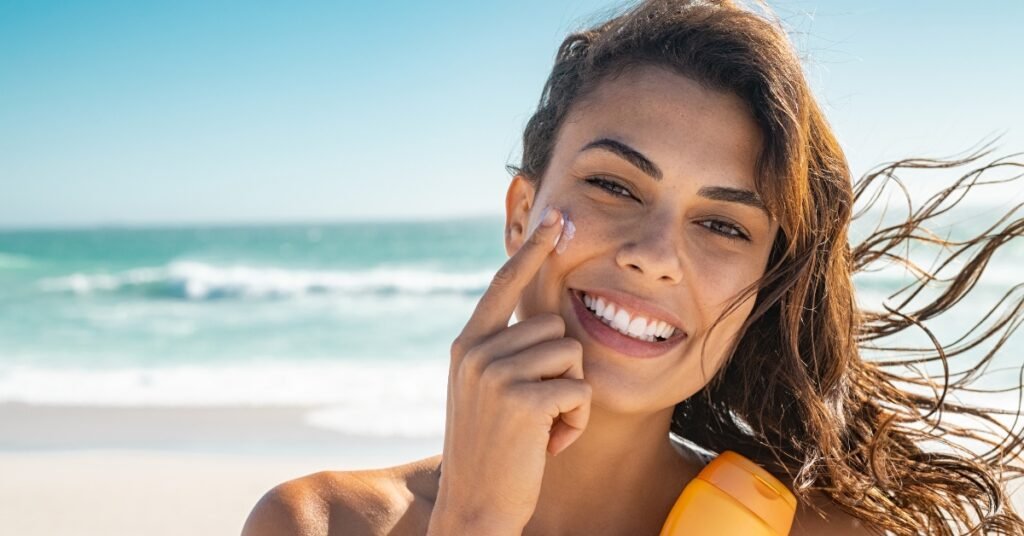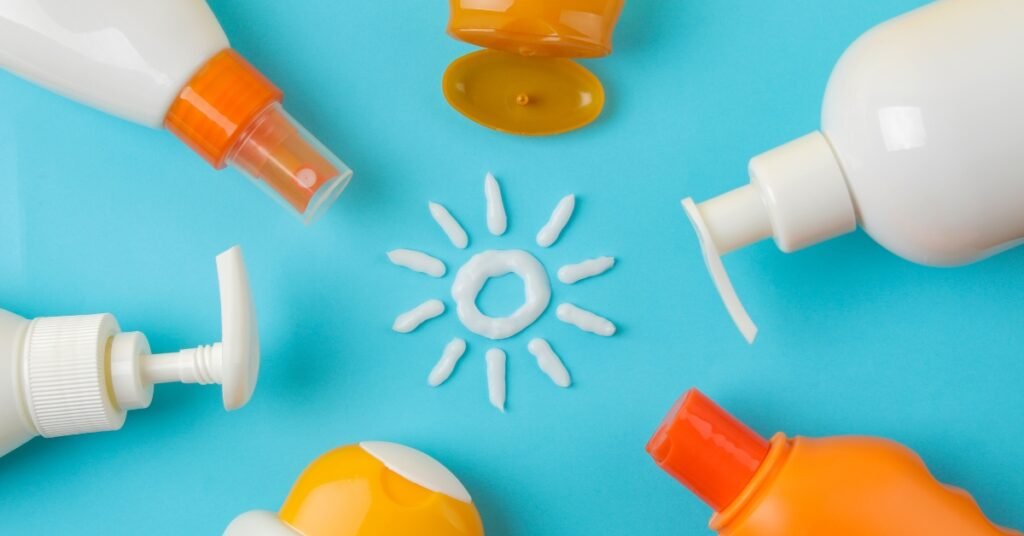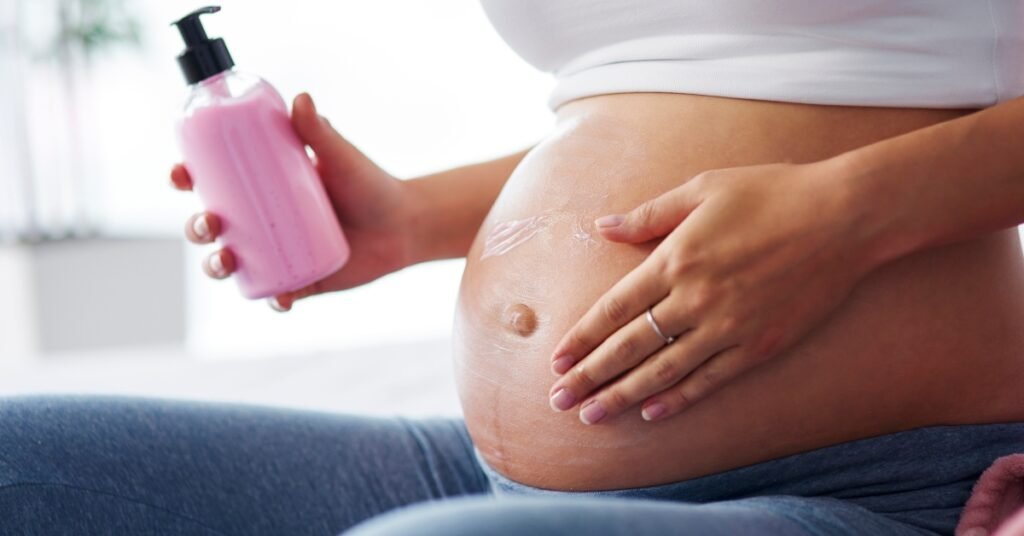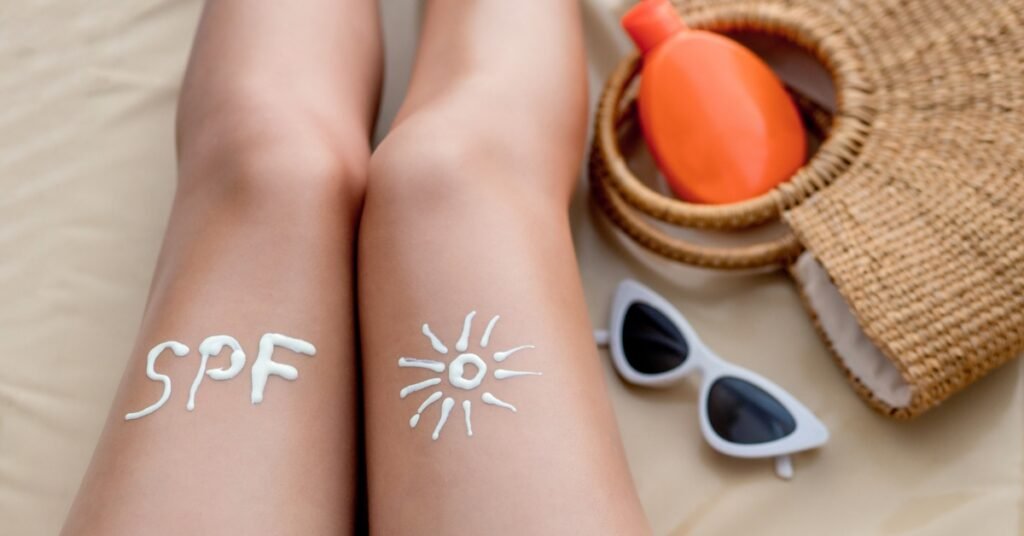Last Updated on 21 February 2024
UPDATED 09 FEBRUARY 2024
Using sunscreen is an essential part of your prenatal routine. It is natural to have questions and concerns about sunscreen use during pregnancy. This guide will address questions about safe sunscreen while pregnant. It will also unravel the mysteries surrounding sun protection for expectant moms.
As an expectant mom, questions about sunscreen might be swirling in your mind. These questions include what sunscreen is safe for different skin types, how often I need to apply sunscreen, and what sunscreen ingredients I must avoid. Fear not; we have compiled comprehensive answers to address your concerns and empower you to bask in the sunshine safely.
Consult your doctor or a certified dermatologist for more information on sunscreen safety during pregnancy. Every pregnancy-safe sunscreen we recommend has a high safety and efficacy rating from the Environmental Working Group. This group evaluates over 1,000 sunscreens annually.
- What makes sunscreen pregnancy-safe?
- What are the benefits of using pregnancy-safe sunscreen?
- Are mineral-based sunscreens safer than chemical-based ones?
- Can I use my regular sunscreen during pregnancy?
- How often should I apply safe sunscreen while pregnant?
- Should women who are pregnant or nursing apply sunscreen more often?
- When should I apply sunscreen during pregnancy?
- Is there a certain SPF level that pregnant or nursing women should use?
- Will using sunscreen affect my vitamin D levels during pregnancy?
- Can sunscreen prevent skin discoloration and melasma during pregnancy?
- Are the natural ingredients in sunscreens safe during pregnancy?
- Can I use spray sunscreen while pregnant?
- Do I need to use safe sunscreen for pregnant women if I am indoors?
- Can I use sunscreen on my face while pregnant?
- What is the best way to apply sunscreen during pregnancy?
- Can I use sunscreen if I have pregnancy-related skin conditions?
- Are there sunscreens specifically designed for pregnant women?
- Can I use a tanning bed with sunscreen during pregnancy?
- How does sunscreen contribute to preventing premature aging during pregnancy?
- Can I use sunscreen during all trimesters of pregnancy?
- Do I avoid any specific ingredients in sunscreens during pregnancy?
What makes sunscreen pregnancy-safe?
Sunscreens are considered pregnancy-safe when developed to reduce the risks to the mother and the developing baby. Pregnancy-safe sunscreens have mineral-based ingredients like zinc oxide or titanium dioxide. Furthermore, pregnancy-safe sunscreens are gentle on the skin, non-irritating, and recommended by dermatologists.
What are the benefits of using pregnancy-safe sunscreen?
Pregnancy-safe sunscreens offer several benefits for the mother and the baby. Safe sunscreens reduce the risk of sunburn, skin damage, premature aging, and the development of skin cancer. These sunscreens can also prevent skin discoloration by shielding the skin from the sun. Pregnant women can protect their health by choosing safe sunscreens without risking the safety of their developing babies.
The American College of Obstetricians and Gynecologists (ACOG) encourages using sunscreen during pregnancy. Sunscreen can help reduce dark spots on the skin, known as melasma. Pregnancy can increase your skin’s sensitivity to external elements, so wearing sunscreen is vital to protect yourself from possible damage.

Are mineral-based sunscreens safer than chemical-based ones?
Mineral-based sunscreens are safer than chemical-based sunscreens. Mineral-based sunscreens use UV blockers like zinc oxide or titanium dioxide to form a physical barrier on the skin. These ingredients stay on the skin’s surface and are less likely to be absorbed into the bloodstream.
Chemical sunscreens, on the other hand, use chemical blockers that may penetrate the skin and get absorbed into the bloodstream. The effects of these chemicals on unborn babies are not fully understood. Therefore, it is best to be cautious and choose mineral-based sunscreens for sun protection.
The Cetaphil Sheer Mineral Face Liquid Sunscreen provides safe and effective protection from UVA and UVB rays without harmful chemicals. Its sheer formula provides broad-spectrum protection against UVA and UVB rays. This prevents sunburn and reduces the risk of skin cancer and early signs of aging. It is advisable to consult with a healthcare professional for recommendations based on your specific needs and concerns.

Can I use my regular sunscreen during pregnancy?
The use of regular sunscreen during pregnancy may have some risks. Some regular sunscreens contain ingredients that can be absorbed into the bloodstream. While the effects of these chemicals on the developing fetus are not fully understood, the American Academy of Dermatology recommends being safe and choosing pregnancy-safe sunscreens.
Look for sunscreens that contain zinc oxide or titanium dioxide as the active ingredients. This is because they stay on the skin’s surface and are considered safe during pregnancy. Avoid sunscreens with chemical UV filters like oxybenzone, avobenzone, octocrylene, and homosalate unless your healthcare provider has specifically approved them. Always check with your healthcare provider to ensure your chosen products align with your health needs.
How often should I apply safe sunscreen while pregnant?
The American Academy of Dermatology recommends applying sunscreen every day. It is essential to reapply sunscreen every two hours if you are outdoors. If you are swimming or sweating, you must apply sunscreen more frequently.
Use sunscreen generously and cover all exposed skin for comprehensive sun protection. You can protect your skin by seeking shade whenever possible, wearing protective clothing, and avoiding peak sun hours between 10 a.m. and 4 p.m.
Should women who are pregnant or nursing apply sunscreen more often?
Pregnant women and nursing mothers should apply sunscreen more often than usual. Pregnancy and nursing can affect the skin’s sensitivity to the sun. This makes it more susceptible to damage from harmful UV rays. Applying sunscreen every two hours or more frequently if swimming ensures the skin remains adequately protected throughout the day. Pregnant women and nursing mothers should take extra precautions to minimize sun exposure. These measures include wearing protective clothing, seeking shade, and avoiding peak sun hours.
When should I apply sunscreen during pregnancy?
Sunscreen should be applied daily, even on cloudy days. It is best to use sunscreen 15–30 minutes before sun exposure to let it absorb thoroughly into the skin. The sunscreen becomes active and protects the skin when you step outside. It is also advisable to seek shade during the sun’s peak hours, usually between 10 a.m. and 4 p.m. Pregnant women can protect their skin from the sun’s harmful rays by following these guidelines. They can reduce the risk of sun damage, premature aging, and skin cancer.

Is there a certain SPF level that pregnant or nursing women should use?
Pregnant women and nursing mothers should use sunscreen with an SPF of 30, such as Sun Bum Original SPF 30 Sunscreen Lotion and Blue Lizard Australian Sunscreen Sensitive SPF 30+ for optimal protection. Furthermore, SPF 30 sunscreens, like Badger Mineral Sunscreen Cream SPF 30 and Alba Botanica Hawaiian Sunscreen Lotion, are recommended during pregnancy because they provide adequate protection and minimize exposure to excessive chemicals.
Sun Protection Factor (SPF) measures the sunscreen’s effectiveness in blocking UVB rays that cause sunburn. An SPF of 30 means the sunscreen filters out approximately 97% of the sun’s UVB rays. Sunscreens labeled “broad-spectrum” protect against UVA and UVB rays, reducing the risk of skin damage and premature aging.
Will using sunscreen affect my vitamin D levels during pregnancy?
While sunscreen is essential for protecting your skin from harmful UV rays, its use can impact vitamin D levels. Sunscreen works by blocking UVB rays, which are responsible for vitamin D synthesis in the skin. When you apply sunscreen, it reduces the skin’s ability to produce vitamin D from sunlight.
However, it is essential to note that there are other sources of vitamin D, such as dietary supplements, fatty fish, fortified dairy products, and certain cereals. Discuss with your healthcare provider If you have concerns about your prenatal vitamin D levels. They may recommend vitamin D supplements or suggest dietary adjustments to ensure you meet your nutritional needs while practicing sun protection.
It is essential to balance protecting your skin from the sun and maintaining adequate vitamin D levels. Your healthcare provider can provide personalized guidance based on your health, lifestyle, and location.
Can sunscreen prevent skin discoloration and melasma during pregnancy?
Yes, sunscreen during pregnancy can help prevent skin discoloration in pregnant women. Melasma often occurs during pregnancy due to hormonal changes and increased sensitivity to the sun. Pregnant women can shield their skin from harmful UV rays by using sunscreen. Regular use of sunscreen reduces the risk of developing skin discoloration.
It is necessary to note that sunscreen alone may not prevent or treat melasma. Pregnant women should consider other measures, like wearing protective clothing, seeking shade, and avoiding peak sun hours. These measures are for comprehensive sun protection and the management of skin discoloration. Your healthcare professional can provide personalized advice regarding the best sun protection measures for your skin.
Are the natural ingredients in sunscreens safe during pregnancy?
Yes, sunscreens with natural ingredients are considered safe for use during pregnancy. However, it is vital to know the specific ingredients and formulations in the product. Antioxidants like vitamin E and green tea extract are natural and organic ingredients often used in sunscreens. Coconut and jojoba oil are famous for their moisturizing properties. Shea and cocoa butter are known for their moisturizing effects, but individual sensitivities vary. Aloe vera is a good sunscreen ingredient known for its soothing properties and is safe when applied topically.
Always read the ingredient list on sunscreen products. If you have any concerns or uncertainties, consult with your healthcare provider. They can provide personalized advice based on your health and specific considerations during pregnancy.

Can I use spray sunscreen while pregnant?
Using sunscreen sprays during pregnancy is generally safe, but it is important to be cautious and choose the right product. You can avoid inhalation by spraying it on your hands before applying it to your body. Apply sunscreen in a well-ventilated area and avoid inhaling spray mist. Do not spray it directly on your face; instead, spread it evenly with your hands to ensure complete coverage.
Do I need to use safe sunscreen for pregnant women if I am indoors?
Wearing sunscreen indoors during pregnancy is advisable because UV rays can penetrate windows. Secondly, certain types of artificial lighting, like fluorescent and halogen lights, emit low levels of UV radiation. Exposure to indoor lighting is typically minimal and not a significant concern for most people. Choose a pregnancy-safe sunscreen to ensure comprehensive protection when spending extended periods indoors. If you have specific concerns about sunscreen use during pregnancy or are unsure about sun exposure, consult your healthcare provider.
Can I use sunscreen on my face while pregnant?
Pregnancy-safe sunscreen on your face protects the skin during pregnancy. Many pregnancy-safe formulations, like CeraVe Moisturizing Lotion SPF 30 Sunscreen and Face Moisturizer, are gentle and suitable for facial application. Always look for gentle formulations labeled safe for pregnancy to ensure adequate UV protection without compromising maternal or fetal health.
What is the best way to apply sunscreen during pregnancy?
The best way to apply sunscreen during pregnancy is generously and evenly, about 15–30 minutes before sun exposure. Reapply every two hours when you are outside. You can also apply sunscreen more frequently if you are swimming or sweating.
Can I use sunscreen if I have pregnancy-related skin conditions?
Yes, many sunscreens are suitable for individuals with pregnancy-related skin conditions. It is advisable to consult with your dermatologist or healthcare provider for personalized recommendations. Choose a pregnancy-safe sunscreen to ensure gentle yet effective UV protection during pregnancy.
Are there sunscreens specifically designed for pregnant women?
Certainly! There are sunscreens explicitly formulated for pregnant women. These formulations often exclude certain chemicals to ensure safety for both mom and baby. I believe that the best sunscreen for pregnancy is Thinkbaby SPF 30 Sunscreen Stick because it contains natural ingredients, and the fragrance is derived solely from natural oils, ensuring a pleasant scent without any harmful effects.

Can I use a tanning bed with sunscreen during pregnancy?
Avoid tanning beds during pregnancy. Tanning beds can cause overheating and pose potential risks to the developing baby. Remember that using sunscreen in a tanning bed does not eliminate these risks. Therefore, safer methods for achieving a sun-kissed glow during pregnancy are encouraged.
If you seek a tan during pregnancy, consider safer alternatives like self-tanning lotions or sprays. These products do not involve exposure to UV radiation and are generally considered safe during pregnancy. It is always a good idea to check with your healthcare provider before using any tanning products or undergoing any treatments during pregnancy to ensure they are safe for you and your baby.
How does sunscreen contribute to preventing premature aging during pregnancy?
Sunscreen prevents premature aging during pregnancy by shielding the skin from harmful UV rays. Ultraviolet rays significantly contribute to wrinkles, fine lines, and sun-induced damage. Choosing a pregnancy-safe sunscreen ensures adequate protection without compromising maternal or fetal health.
Can I use sunscreen during all trimesters of pregnancy?
Yes, it is safe to use sunscreen during all trimesters of pregnancy. Choose pregnancy-safe sunscreens to ensure adequate UV protection without compromising maternal or fetal health. Prioritize the well-being of your skin by incorporating sunscreen into your skincare routine throughout every stage of pregnancy.
Do I avoid any specific ingredients in sunscreens during pregnancy?
It is advisable to avoid sunscreens containing certain chemical ingredients like retinoids, oxybenzone, and avobenzone. These chemicals may harm fetal development. Choose pregnancy-safe sunscreens formulated with mineral-based ingredients like titanium dioxide or zinc oxide. Mineral sunscreens provide adequate UV protection without potential maternal or fetal health risks. Consult your healthcare provider for personalized advice on sunscreen use during pregnancy.
Navigating the realm of pregnancy-safe sunscreens has been an enlightening journey. I hope the answers to these frequently asked questions will enable you to choose the right sunscreen for you and your unborn baby. I encourage you to embrace the sun as you embark on this radiant adventure. Remember that your journey is unique, and your skin protection should be too.
Author Biography









